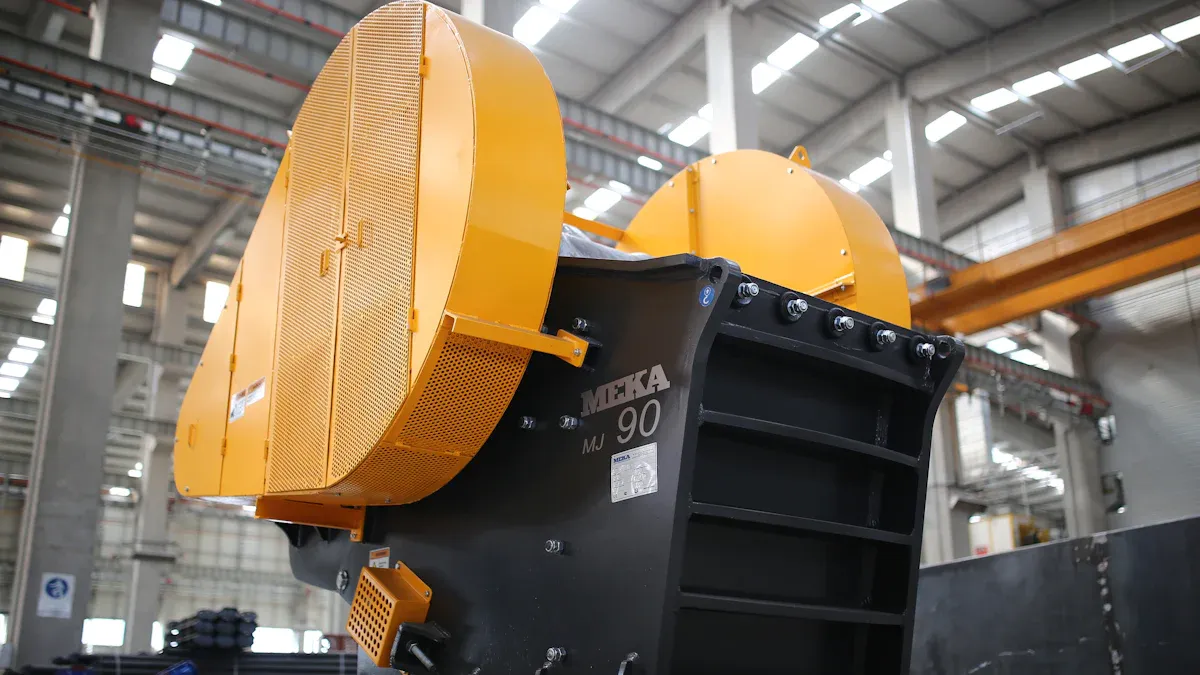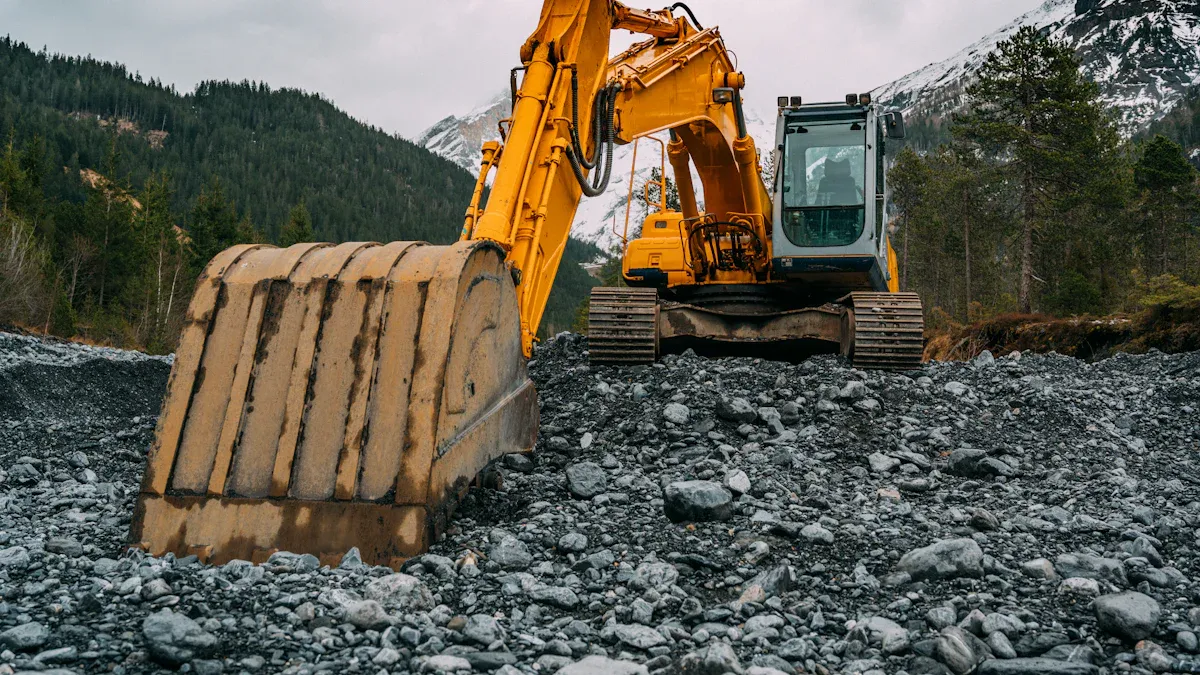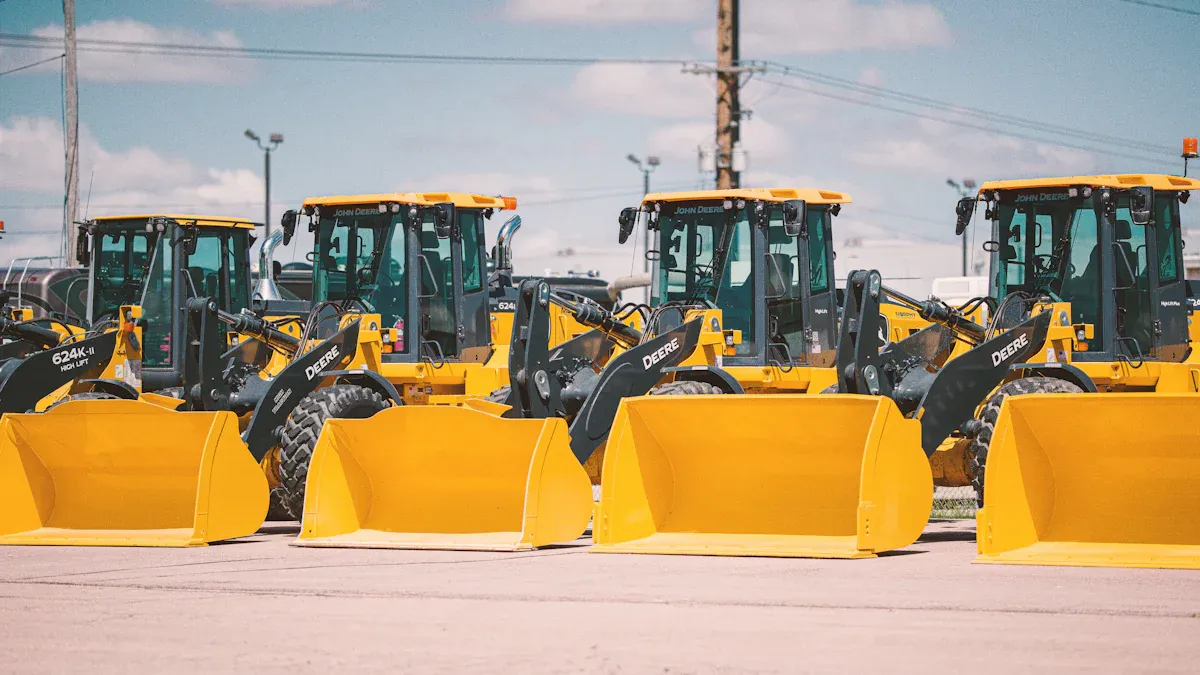
Contractors in 2025 look for the best jaw crusher machine. Top choices include Sandvik QJ341, Metso Nordberg C Series, Terex Powerscreen Premiertrak, Kleemann MC, McCloskey J-Series, and Pioneer Jaw Crusher. These models shine with strong performance, reliable crusher parts, and high Mn steel. Each handles jaw crusher parts and even rivals the gyratory crusher.
| Model | Crushing Power | Durability | Material |
|---|---|---|---|
| Sandvik QJ341 | High | Excellent | High Mn Steel |
| Metso Nordberg C Series | High | Great | High Mn Steel |
| Terex Powerscreen Premiertrak | Good | Good | Steel |
| Kleemann MC | High | Excellent | Alloy |
| McCloskey J-Series | Good | Great | Steel |
| Pioneer Jaw Crusher | Good | Good | Steel |
Key Takeaways
- Choose a jaw crusher based on project size. Machines under 300 tons per hour suit small jobs, while those over 800 tons fit large operations.
- Select models with high efficiency and output quality. Advanced designs can increase throughput by up to 30%, saving time and costs.
- Consider long-term value and resale potential. Durable machines like Sandvik and Metso models often retain their value better over time.
Jaw Crusher Machine Performance and Productivity

Crushing Capacity
Crushing capacity matters a lot for contractors. The right jaw crusher machine can make a big difference in how much material gets processed each day. Contractors often choose machines based on the size of their projects. Here’s a quick look at what different models can handle:
- Machines with less than 300 tons per hour work best for small projects.
- Models that process 300 to 800 tons per hour fit medium-sized jobs.
- The largest jaw crusher machine models can handle over 800 tons per hour, which suits big mining operations.
- Some compact models, like the Senya 600 MICRO Jaw Crusher, process between 60 to 80 tons per hour.
- Top models can reach up to 1,200 tons per hour.
Tip: Contractors should always match the machine’s capacity to their project needs. Picking the right size helps avoid production drops and keeps the job on track.
Efficiency and Output Quality
Efficiency and output quality set the best jaw crusher machines apart. These machines help contractors crush stone faster and lower their costs. Many leading models use smart designs to boost performance. For example:
- Sandvik’s QJ341 stands out for reliability and high output.
- Metso’s Nordberg C Series, including the C106, C120, and C130, delivers strong crushing power and high reliability.
- The CJ211 model offers flexibility for different job sites.
Contractors like James Carter have seen a 15% increase in throughput with advanced models. Elena Rodriguez finished site prep two weeks early after her team’s Pro Model increased capacity by 30%. These results show that the right jaw crusher machine can save time and money while delivering top-quality crushed material.
Jaw Crusher Machine Cost and Total Ownership
Initial Purchase Price
Contractors often look at the price tag first. Some jaw crusher machines cost more because they offer extra features or bigger capacity. Sandvik QJ341 and Metso Nordberg C Series usually sit at the higher end. Smaller models like Pioneer Jaw Crusher come with a lower price. Buyers can choose how to pay. They might buy the machine outright, take a loan, or lease it. Here’s a quick look at the main financing options:
| Financing Option | Description |
|---|---|
| Full Purchase | You own the asset outright, which is simple and builds equity in the machine. Best for strong cash reserves. |
| Financing (Loan) | Payments are made over time, and you own the machine at the end, preserving working capital for other needs. |
| Leasing | Rent the machine long-term with lower monthly payments. Options to return, renew, or purchase at lease end. |
Operating Costs
Running a jaw crusher machine means paying for fuel, maintenance, and spare parts. Some models use less fuel and need fewer repairs. Kleemann MC and McCloskey J-Series often help contractors save money over time. Contractors also look for machines with easy-to-find parts. Lower operating costs can make a big difference in profit.
Tip: Leasing or financing can free up cash for repairs and upgrades.
Long-Term Value
A jaw crusher machine with strong resale value helps contractors in the future. Machines that last longer and keep working well hold their value. Sandvik and Metso models often sell for more after years of use. Contractors who pick durable machines spend less on replacements. They also get better deals when trading in old equipment.
- Contractors can choose to loan or lease new or used equipment.
- Some lenders offer extra working capital or help consolidate debt.
Jaw Crusher Machine Application Suitability
Material Versatility
Contractors often work with many types of materials. They need a jaw crusher machine that can handle concrete, asphalt, and natural stone. Some models stand out because they crush hard and soft materials with ease. For example, the K-JC 704 and K-JC 503 models work well with concrete, limestone, sandstone, granite, brick, and cold asphalt. These machines help contractors switch between jobs without changing equipment.
Here’s a quick look at how these models compare:
| Model | Material Versatility | Jaw Inlet Opening | Recommended Pre-processing |
|---|---|---|---|
| K-JC 704 | Handles concrete, limestone, sandstone, granite, asphalt, and other natural rocks | 27″ x 16″ | 16″ minus |
| K-JC 503 | Handles concrete, softer stone, brick, cold asphalt, and other natural rocks | 19″ x 12″ | 10″ minus |
Note: Contractors who choose versatile machines save time and money. They do not need to buy extra equipment for each type of material.
Industry Fit
Every industry has its own needs. Road builders crush asphalt and concrete. Quarry operators process natural stone. Demolition crews break down brick and mixed rubble. The right jaw crusher machine helps each group finish jobs faster. Sandvik QJ341 and Metso Nordberg C Series fit large construction sites and mining operations. K-JC models work well for recycling and small projects.
- Road construction teams prefer machines that handle asphalt and concrete.
- Quarry operators need crushers for hard stone.
- Recycling companies look for compact machines that process mixed materials.
A contractor who picks the right machine for their industry gets better results. They finish projects on time and keep costs low.
Jaw Crusher Machine Maintenance and Durability
Ease of Maintenance
Contractors want machines that make their work easier. They look for jaw crusher models with smart features that save time during servicing. Sandvik jaw crushers use hydraulic drives and real-time diagnostics. These features help crews spot problems fast and fix them before they get worse. Metso jaw crushers come with advanced monitoring systems. These systems let teams check the health of the machine while it runs. Terex jaw crushers offer hydrostatic or electric drives. Operators can adjust settings quickly, which makes maintenance smoother. Superior Liberty jaw crushers use bolted frame construction and modular design. This setup allows for easy access and simple repairs.
- Sandvik: Hydraulic drives and diagnostics for quick fixes
- Metso: Real-time health checks for better planning
- Terex: Fast adjustments with hydrostatic or electric drives
- Superior Liberty: Modular design for easy maintenance
Tip: Machines with smart maintenance features help contractors avoid long downtimes and keep projects moving.
Wear Resistance and Spare Parts Availability
Durability matters when crews use a Jaw Crusher Machine every day. Contractors choose models with tough materials like high manganese steel or strong alloys. These materials help the machine resist wear and last longer. Sandvik and Metso models stand out for their wear resistance. Crews find spare parts for these brands easily, which means less waiting and more working. Terex and McCloskey also offer good access to replacement parts. Contractors like machines that keep running without frequent breakdowns.
Note: Reliable spare parts and strong materials help contractors finish jobs on time and save money on repairs.
Jaw Crusher Machine After-Sales Support
Warranty and Service
Contractors want peace of mind when they buy heavy equipment. A strong warranty and good service can make a big difference. Some manufacturers stand out in 2025 for their support.
- Komatsu gives a warranty that covers both parts and labor for 24 months or 4,000 hours. This shows they trust their machines to last.
- JXSC offers 24/7 support and a global network for spare parts. Contractors can get help any time, which keeps projects moving.
Many brands also provide fast shipping for replacement parts. This helps crews avoid long delays. Good service teams answer questions quickly and send technicians when needed. Contractors who choose a Jaw Crusher Machine from a company with strong support spend less time worrying about breakdowns.
Tip: Always check the warranty details before buying. A longer warranty often means better protection for your investment.
Training and Technical Assistance
Learning how to use new equipment can feel tough. The best manufacturers help contractors get started. They offer training for operators and mechanics. Some companies send trainers to the job site. Others provide online videos and manuals.
Technical assistance matters, too. When a problem comes up, contractors want answers fast. Many brands have hotlines or chat support. JXSC stands out with 24/7 help, so crews never feel stuck. Good training and support help teams use the Jaw Crusher Machine safely and get the best results.
Note: Well-trained crews work faster and safer. They also help the machine last longer.
Jaw Crusher Machine Side-by-Side Comparison

Key Specifications Table
Choosing the right crusher can feel tricky. Contractors want to see the numbers side by side. Here’s a table that compares the top models on the market. It covers crushing capacity, mobility, weight, and safety features.
| Model | Crushing Capacity (tph) | Mobility Type | Weight (tons) | Notable Safety Features |
|---|---|---|---|---|
| Sandvik QJ341 | 225–1000 | Track-mounted | 48 | Auto unblock, operator shields |
| Metso Nordberg C Series | 110–1200 (varies) | Modular/Track | 40–60 | Auto unblock, dust control |
| Terex Powerscreen Premiertrak | 200–800 | Track-mounted | 45 | Material size matching |
| Kleemann MC | 250–900 | Track-mounted | 50 | Operator safety guidelines |
| McCloskey J-Series | 200–800 | Track-mounted | 44 | Dust suppression, safety rails |
| Pioneer Jaw Crusher | 150–500 | Wheeled/Stationary | 38 | E-stop, safety covers |
Safety matters on every job site. Top models include features like automatic unblock systems and shields to protect operators from dust and flying debris.
Contractors also care about how easy it is to move these machines. Some portable crushers, like the Barford 750J, are built for quick moves between job sites. Compact models such as the Dragon CR400 fit into tight spaces and load up fast. These features help contractors save time and money when moving equipment.
- Portable crushers cut down on transport costs.
- Compact models work well for small spaces and quick setups.
- Quick relocation means less downtime between jobs.
Pros and Cons of Each Model
Every contractor has different needs. Some want power. Others want easy transport or low costs. Here’s a look at what each model does best—and where it might fall short.
| Model | Pros | Cons |
|---|---|---|
| Sandvik QJ341 | Heavy-duty build, high capacity, global support, real-time diagnostics | Higher price, heavier to transport |
| Metso Nordberg C Series | Modular design, wide capacity range, smart maintenance, resale value | Can be complex for new users, higher initial cost |
| Terex Powerscreen Premiertrak | Good capacity, easy controls, reliable for mid-sized jobs | Not as rugged for extreme conditions |
| Kleemann MC | Excellent durability, strong output, good for tough materials | Spare parts may take longer to arrive in some regions |
| McCloskey J-Series | Fuel efficient, easy maintenance, good parts access | Lower max capacity than some rivals |
| Pioneer Jaw Crusher | Affordable, simple design, easy to operate | Fewer advanced features, lower output |
Let’s look closer at Sandvik QJ341 and Metso Nordberg C Series. These two stand out for contractors who want the best. Here’s a quick comparison:
| Feature | Sandvik QJ341 | Metso Nordberg C Series |
|---|---|---|
| Design | Heavy-duty structure for extreme conditions | Modular design for rapid transfer and deployment |
| Capacity | 225–1000 tons/hour | Stepped capacity configuration with multiple models available |
| After-sales support | Global network with real-time remote diagnosis | Intelligent maintenance system for high uptime |
| Application | Specialized crushing in mining, tunnel engineering, etc. | Adapted for various crushing scenarios like mines and aggregates |
Contractors who need to move their Jaw Crusher Machine often may prefer modular or portable designs. These save time and lower transport costs.
Safety features also play a big role. Here are some of the most important ones found in top models:
| Safety Feature | Description |
|---|---|
| Automatic unblock system | Developed to eliminate the need for operators to manually remove blocked material, enhancing safety. |
| Proper material size matching | Ensures that raw material size is appropriate for the jaw opening, reducing blockage incidents. |
| Operator safety measures | Includes guidelines to protect operators from risks such as exposure to dust, noise, and ejected objects. |
Tip: Always check for safety features before buying. A safer machine keeps crews working and avoids costly accidents.
Contractors should think about what matters most for their jobs. Some need high output. Others want easy moves or top safety. Comparing these models side by side helps every contractor find the right fit.
Most contractors pick the Sandvik QJ341 for its balance of power and reliability. Small operations often choose the Nordberg C80 for easy transport and strong performance. Heavy-duty jobs favor the KPI-JCI Vanguard 2056 or Keestrack B3. Contractors should match a Jaw Crusher Machine to their material needs and support options.
FAQ
What size jaw crusher machine works best for small contractors?
Small contractors often pick compact models. These machines fit tight spaces and move easily. They usually handle up to 300 tons per hour.
How often should crews perform maintenance on a jaw crusher?
Crews should check the machine daily. They need to inspect wear parts and clean debris. Regular checks help prevent breakdowns and keep jobs on schedule.
Can one jaw crusher handle different materials on the same job?
Yes! Many top models crush concrete, stone, and asphalt. Contractors save time because they do not need to switch machines for each material.
Post time: Aug-29-2025